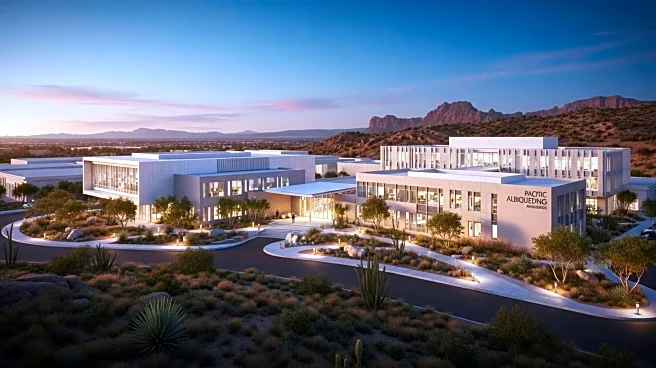What is the story about?
What's Happening?
Pacific Fusion, a Fremont-based energy startup, has selected Albuquerque, New Mexico, as the site for its new research and manufacturing campus, bypassing offers from two Bay Area cities, Livermore and Alameda. Both cities had actively courted the company, offering land, permits, and incentives to host the $1 billion project. Albuquerque's successful bid included $10 million for land acquisition and construction, along with substantial tax exemptions. Pacific Fusion aims to build on the breakthroughs achieved by the National Ignition Facility in Livermore, which in 2022 briefly created positive net energy in a fusion experiment. The company plans to develop a fusion system that generates more energy than it consumes by 2030.
Why It's Important?
The decision by Pacific Fusion to establish its new facility in Albuquerque rather than the Bay Area highlights the competitive nature of attracting high-tech energy projects. This move could significantly impact the local economy in Albuquerque, bringing jobs and investment to the area. For the Bay Area, missing out on this project represents a lost opportunity to further cement its status as a hub for cutting-edge energy research. The development of a successful fusion energy system could revolutionize the energy industry by providing a clean, virtually limitless power source, reducing reliance on fossil fuels and contributing to climate change mitigation efforts.
What's Next?
Pacific Fusion will proceed with the development of its Albuquerque facility, leveraging the proximity to Sandia National Laboratories and a workforce aligned with its needs. The company will continue to expand its operations in California, maintaining its headquarters in Fremont and other facilities in San Leandro and Livermore. The focus will be on achieving a commercially viable fusion energy system by 2030, which could attract further investment and interest from both public and private sectors.
Beyond the Headlines
The choice of Albuquerque over the Bay Area may reflect broader trends in the relocation of tech and energy companies seeking more cost-effective environments for large-scale projects. This decision underscores the importance of strategic incentives and partnerships in attracting high-tech industries. Additionally, the pursuit of fusion energy technology raises ethical and environmental considerations, as the successful commercialization of fusion could disrupt existing energy markets and necessitate new regulatory frameworks.














